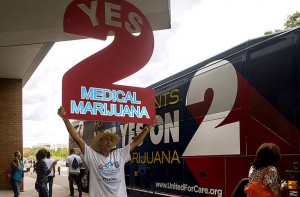 Epileptic children who suffer from debilitating seizures would be able to legally turn to a non-smokable, low-THC variety of medical marijuana for relief under a measure given final approval by state senators Monday.
Epileptic children who suffer from debilitating seizures would be able to legally turn to a non-smokable, low-THC variety of medical marijuana for relief under a measure given final approval by state senators Monday.
Named after a Colorado child, the strain of cannabis known as “Charlotte’s Web” is high in the non-euphoric cannabidiol (CBD), and low in the high-inducing chemical tetrahydrocannabinol (THC).
Sen. Rob Bradley, a Fleming Island Republican, who sponsored the bill with two fellow GOP senators, said he opposed legalizing marijuana but wholeheartedly supported extending help to “desperate parents.”
“These desperate parents have tried everything,” Bradley said. “Under current law, they are criminals…and that’s not right, any law that defines them as criminal defies commons sense.”
Given as an oil-based extract placed under the child’s tongue, “Charlotte’s Web” has “the potential to stop seizures,” said co-sponsor, Sen. Aaron Bean, R-Fernandina Beach.
“We’ve seen the number of seizures go from 400 to 300 [a month], to three or four or two, or in some cases zero,” Bean said. “Let’s bring that hope to Florida.”
An 11-year-old Gulf Breeze girl, Ray Ann Moseley, who suffers from daily, crippling seizures and has been diagnosed with cerebral palsy and intractable epilepsy, visited the Senate chamber prior to Monday’s 36-3 vote.
Gangly and wide-eyed, she stood when she was introduced amid applause, briefly placing her hands over her ears.
“This is about kids, this about kids who have a health problem,” Sen. Maria Sachs, D-Delray Beach, said. “Let’s get the focus off of the drug and let’s get the focus on the patient.”
Sen. Thad Altman, R-Rockledge, called for a resounding defeat of SB 1030, saying there needed to be more oversight by the Federal Drug Administration.
“I truly believe we need to stick to good science and that we need to take an approach that is proven,” Altman said. “Ultimately, the compassionate thing is to develop a scientific method to ensure that this happens.”
Joining Altman in dissent were Senators Dorothy Hukill, R-Port Orange, and Jack Latvala, R-Clearwater.
Under the proposed legislation, the state Department of Health would be responsible for regulation and oversight.
The House companion bill (HB 843) is poised for a floor vote in that chamber. Under that version, doctors who fraudulently prescribe “Charlotte’s Web” could face jail time and fines.
In November, Florida voters will weigh in when they cast ballots on a constitutional amendment legalizing all forms of medical marijuana.



 Medical marijuana is a hot topic issue that has been in the news for years, but more recently is gaining serious momentum as more and more states are declaring medical marijuana legal. This issue has been a highly discussed topic in Florida politics.
Medical marijuana is a hot topic issue that has been in the news for years, but more recently is gaining serious momentum as more and more states are declaring medical marijuana legal. This issue has been a highly discussed topic in Florida politics. Back in November, Amendment 2, which would legalize medical marijuana, needed 60 percent of the votes in order to pass. It fell short by a mere 2 percent. United for Care, the medical marijuana group that made Amendment 2 possible, is petitioning to get
Back in November, Amendment 2, which would legalize medical marijuana, needed 60 percent of the votes in order to pass. It fell short by a mere 2 percent. United for Care, the medical marijuana group that made Amendment 2 possible, is petitioning to get  Epileptic children who suffer from debilitating seizures would be able to legally turn to a non-smokable, low-THC variety of medical marijuana for relief under a measure given final approval by state senators Monday.
Epileptic children who suffer from debilitating seizures would be able to legally turn to a non-smokable, low-THC variety of medical marijuana for relief under a measure given final approval by state senators Monday.